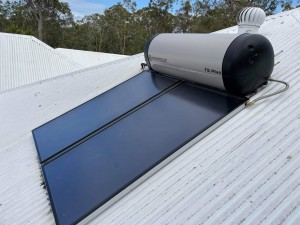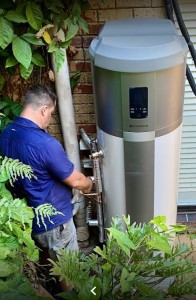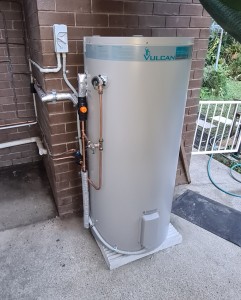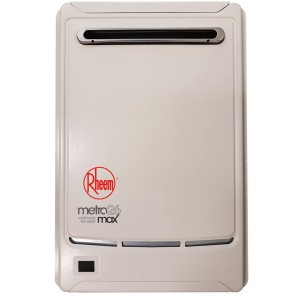When choosing a replacement for your hot water system and deciding between solar, heat pump, gas or electric, it’s important to evaluate factors such as household size, location, budget, and energy efficiency. These considerations will guide you in selecting the most suitable option, balancing initial costs with long-term savings and performance. Below are some pros and cons of each hot water system:
-
Solar Hot Water Systems
 Pros
Pros
- Energy Efficient – solar hot water systems use free energy from the sun reducing the reliance on electricity or gas.
- Lower Operating Costs and Long-Term Savings: Once installed, solar systems have minimal ongoing costs, leading to significant savings on energy bills.
- Potential Rebates and Incentives: Many governments offer rebates or incentives for installing solar hot water systems.
- Environmentally Friendly: Solar systems reduce carbon emissions and your household’s environmental impact.
- Cons
- High Upfront Costs: Solar systems can be expensive to purchase and install compared to other hot water systems.
- Weather Dependent: The system’s efficiency depends on the amount of sunlight available, which can be a limitation in cloudy or cold climates.
- Requires Backup System: In areas with less sunlight and on rainy and overcast days, a backup electricity or gas may be needed, increasing the overall running costs.
- Roof Space Requirement: Solar panels and storage tanks require space, which may not be suitable for all homes, especially those with limited roof space.
- Ideal For
- Medium to large households looking for energy efficiency and long-term savings
-
Heat Pump Hot Water Systems
 Pros
Pros
- Energy Efficient: Heat pumps use ambient air to heat water, making them highly efficient and reducing electricity consumption by up to 71% compared to electric systems.
- Environmentally Friendly: They use renewable energy sources, reducing greenhouse gas emissions and your household’s carbon footprint.
- Long-Term Savings: Though the upfront cost is higher, the reduced energy consumption can result in significant long-term savings on energy bills.
- Operates in Various Climates: Heat pumps can function in a wide range of temperatures.
- Can Run on Solar Power: Heat pumps can be paired with solar PV systems to further reduce energy costs.
- Cons
- Higher Upfront Cost: The initial cost of purchasing and installing a heat pump system is higher than traditional electric or gas systems.
- Noisier Operation: The compressor and fan in the heat pump system can be noisier than other types of hot water systems, especially if located near living spaces.
- Requires Outdoor Installation: Heat pump systems require outdoor installation with sufficient airflow, which may not be ideal for homes with limited space.
- Ideal For
- Any household size who are energy conscious and looking for long-term savings
 Electric Hot Water Systems
Electric Hot Water Systems
- Pros
- Low Upfront Cost: Electric hot water systems are generally cheaper to purchase and install compared to solar or heat pump systems.
- Easy Installation: They are straightforward to install and can be placed in almost any location.
- Reliable Performance: Electric systems provide consistent hot water regardless of the weather or time of day.
- Compact Size: Electric hot water systems are typically smaller, making them ideal for homes with limited space.
- Works in All Climates: Unlike solar or heat pumps, electric systems aren’t affected by outdoor temperatures or sunlight, making them suitable for any climate.
- Cons
- Higher Operating Costs: Electric systems tend to have higher ongoing energy costs due to the amount of electricity required to heat water.
- Less Energy Efficient: Compared to solar or heat pumps, electric systems are less energy-efficient, contributing to higher energy bills and a larger carbon footprint.
- No Power, No Hot Water: In the event of a power outage, an electric hot water system will not be able to heat water, which could be inconvenient.
- Environmental Impact: Since electric systems rely heavily on grid electricity, which often comes from fossil fuels, they have a greater environmental impact compared to more renewable-based systems.
- Limited Hot Water Supply: Depending on the size of the tank, an electric system can run out of hot water if the demand exceeds the capacity, leading to delays in heating more water.
- Ideal For
- Smaller households with lower upfront budgets where energy efficiency isn’t the top priority.
- Pros
- Gas Hot Water Systems (Natural Gas)
- Pros
- Faster Heating: Natural Gas systems heat water much faster than electric
 systems, providing hot water on demand with minimal waiting time.
systems, providing hot water on demand with minimal waiting time. - Lower Operating Costs: Natural gas is generally cheaper than electricity, leading to lower long-term running costs, especially in areas where natural gas is readily available.
- Consistent Hot Water Supply: Gas systems, especially tankless models, provide continuous hot water without the risk of running out during high-demand periods.
- Works During Power Outages: Natural gas systems do not rely on electricity, so they continue to function during power outages, ensuring uninterrupted hot water supply.
- Higher Upfront Costs: Gas systems can be more expensive to install than electric systems, particularly if your home doesn’t already have a natural gas connection.
- Lower Operating Costs: Natural Gas is generally cheaper than electricity, leading to lower long-term running costs, especially in areas where natural gas is readily available.
- Faster Heating: Natural Gas systems heat water much faster than electric
- Cons
- Higher Upfront Installation Costs: Installing a natural gas hot water system can be more expensive, especially if your home does not already have a natural gas connection.
- Requires Gas Access: You need access to natural gas, which may not be available in all areas, limiting where the system can be installed.
- Provider Quarterly Charges: Your gas provider will charge you for quarterly access charges despite your usage.
- More Maintenance: Gas hot water systems require regular servicing to ensure safe and efficient operation, especially to prevent gas leaks or carbon monoxide risks.
- Environmental Impact: While cleaner than other fossil fuels, natural gas is still a non-renewable energy source, contributing to greenhouse gas emissions.
- Safety Concerns: Gas leaks pose potential fire and explosion risks, and systems need to be regularly inspected to ensure safe operation.
- Tank Storage Models Can Be Less Efficient: Traditional gas systems with storage tanks can lose heat (standby heat loss) when water is stored for extended periods, which can reduce overall energy efficiency.
- Ideal For
- Homes with access to natural gas looking for faster heating and cost efficiency.
- Pros
-
- Pros
- Faster Heating: LPG gas systems heat water quickly, providing near-instant hot water compared to electric systems.
- On-Demand Hot Water: Instantaneous LPG systems offer continuous hot water, eliminating the risk of running out during high-demand periods.
- Works During Power Outages: LPG hot water systems can continue functioning during power outages, ensuring uninterrupted access to hot water.
- Portable and Flexible: LPG cylinders are portable and can be refilled easily.
- Cons
- Higher Ongoing Costs: LPG is often more expensive per unit of energy compared to natural gas or electricity, leading to higher ongoing operational costs.
- Storage Requirements: LPG requires a storage tank or cylinder that needs regular refilling, which can be inconvenient and lead to added maintenance and delivery costs.
- Environmental Impact: LPG is a fossil fuel and contributes to carbon emissions.
- Limited Supply: If LPG cylinders run out and aren’t refilled on time, you could be left without hot water, which can be a problem in remote areas with infrequent deliveries.
- Initial Installation Costs: Installing an LPG system, especially for homes not already set up for LPG, can incur significant upfront costs for equipment, storage, and installation.
- Safety Concerns: LPG, like any gas, carries a risk of leaks, which could pose fire or explosion hazards if not properly handled and stored.
- Ideal For
- smaller households with lower upfront budgets where energy efficiency isn’t the top priority.
- Pros
If you require further assistance making the right choice for your household, contact our friendly team of experts at King Solar Man today on 0416 075 682.
